Conference Report 9th International Conference on Business, Relations, and Diplomacy (ICOBIRD 2020)
The world has been disturbed by COVID-19 which was known as the Novel Corona Virus emerged in Wuhan, a city in China in November 2019. It has spread out to all over the world within a short period of time. It was declared as global pandemic by WHO (World Health Organization) for it spreads to more than 200 countries in the world. Covid-19 has changed the world dynamic social, political and economic relations. Most countries leaders have controlled their citizen social interaction in the form of lockdown, restricted movement, and social distancing. They also controlled territorial borders which have affected their own domestic and international economic activities.
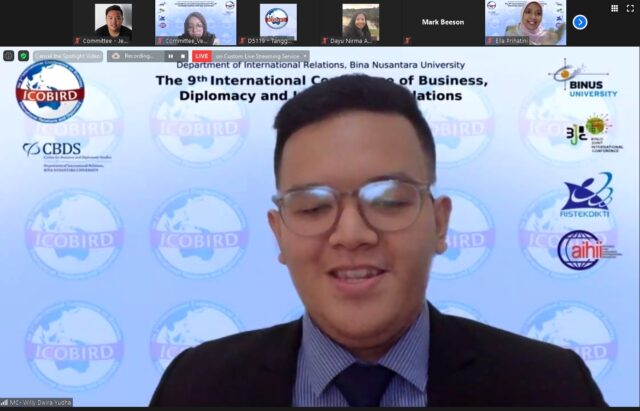
The relevance of the state is prevalent due to the highest order in society in managing the pandemic. The State has to take over all charges in ensuring that Covid-19 pandemic manageable and stop from spreading out wider in society. The state has to control economic activities which has been usually taken over by the market. In international level, the state has to control its territorial borders in order to stop the spread of the pandemic. The state leaders must adopt their diplomatic communication from the conventional way- face to face diplomacy to highly technological and digital diplomacy. The relations between state to state has gradually taken different method and used high technological instruments with the usage of Internet, big data and Artificial Intelligence.
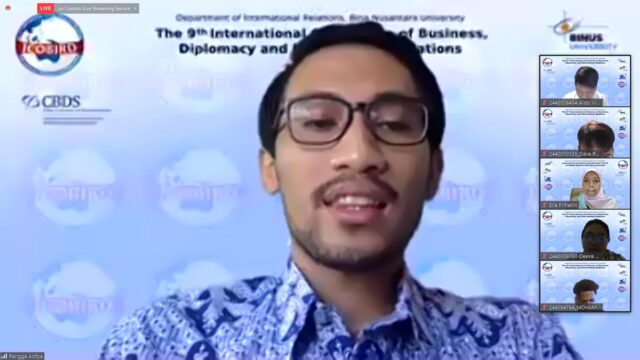
In line with this phenomena, International Relations Department, Faculty of Humanities, Bina Nusantara University has successfully organized two days International Conference on Business, International Relations, and Diplomacy (known as ICOBIRD) under the theme “Business, International relations, and Diplomacy during COVID-19 Pandemic: Challenges, Responses, and Consequences” from September 24 to September 25, 2020. The Department has been successfully organizing ICOBIRD for 9 years continuously since its establishment.
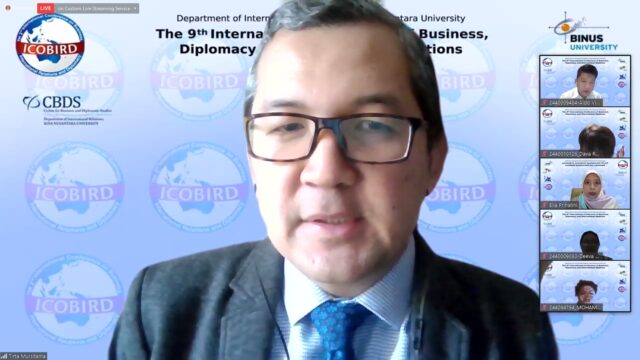
This year conference was the 9th of its annual event, and though it was conducted in an online format, it did not reduce the importance of this event. Indeed it was the department’s dynamic response to the context where we are living now. ICOBIRD 2020 which was hosted by the Department of International University in collaboration with the Indonesian Association for International Relations (AIHII) took the form of webinar. It is part of BINUS International Joint Conference (BIJC). ICOBIRD has been a renowned international conference that provides a platform for scholars, students, and researchers to share their research outputs. This year’s conference was based on an interdisciplinary approach in understanding Covid-19 Pandemic and its impacts on business, international relations, and diplomacy.
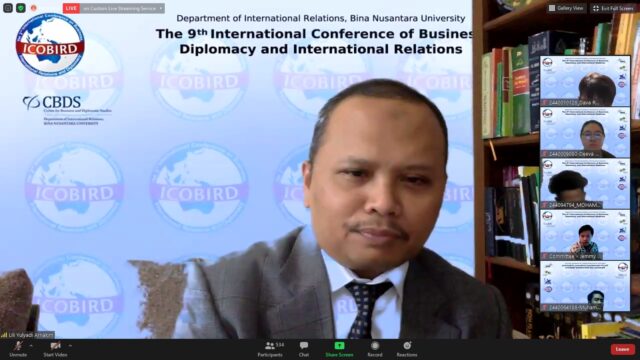
As it was reported that the committee received 53 submission but they accepted only 35 papers, due to the blind review and limited venue of publication. 35 papers have been presented in 8 parallel sessions after the opening and key note session in the morning of first day conference, September 24, 2020. ICOBIRD 2020 was opened by MC Willy Dwira Yudha and followed by singing Indonesian national song and BINUS Hymn. Furthermore, chair of ICOBIRD 2020 Dr. Lili Yulyadi Arnakim welcomed the presenters and participants, which was followed by welcoming remarks by Head of International Relations Department, Rangga Aditya Ph.D. Finally ICOBIRD 2020 was officially launched by Prof. Dr. Tirta N. Mursitama Ph.D as Vice Rector, of Research and Technology Transfer, and general chair of BJIC. In his speech he announced that ICOBIRD 2020 is the third conference after ICOBAR, and ICIMTech. After opening ceremony, three distinguish keynote speakers from different countries namely, Malaysia, South Korea, and Australia presented their keynote speeches.

First keynote speaker Dr. Ishtiaq Hussain, who is Associate Professor of Political Science at International Islamic University, Malaysia (IIUM), and Chief editor of Intellectual Discourse from Kuala Lumpur, discussed the response of developing countries toward covid-19. Dr. Ishtiaq Hossain argues that the responses can be classified into three categories, namely, good, muddled, and the ugly, by referring respectively to Senegal, Bangladesh, and Brazil. This session which was moderated by Dr. Moch. Faisal Karim received enthusiastic response from the audience.
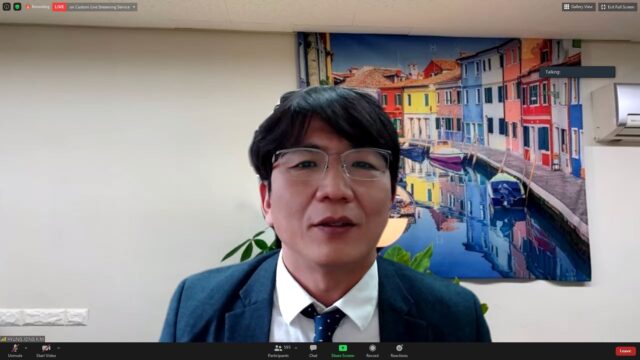
Second keynote speaker Dr. Kim Hyung Jong from Department of International Relations, Yonsei University, South Korea discussed ASEAN Community and human security. He argues that the coronavirus disease (COVID-19) poses great challenges not only for health security in the region but also for the establishment of the ASEAN Community. The ASEAN member states (AMS) are facing double challenges: they have to curb the pandemic while mitigating its economic and social impacts. AMS has to deal with COVID-19 by taking assertive measures to protect public health in the region. The session which was moderated by Dr. Lili Yulyadi Arnakim, received many questions from the audiences. Finally, third keynote speaker Prof. Dr. Mark Beeson from Department of Political Sciences and International Relations, University of Western Australia discussed the politics of Covid-19.
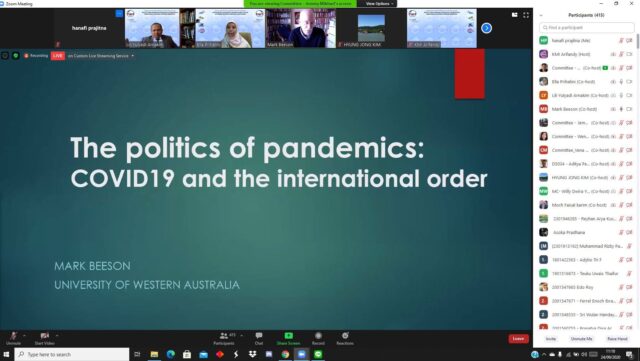
Prof. Mark Beeson’s ession which was moderated by Dr. Ella S. Prihatini, argues that The response of the United States has been strikingly bad, and this has undermined confidence in its ability to play an effective leadership role in an international order it did so much to create. The prospects for cooperation between China and the US on health policy and other vital issues such as climate change have been further eroded as a result. This presentation considers the political consequences of the pandemic on the current international order and our collective ability to deal with major transnational problems. This keynote session was open to public via Zoom and live through YouTube streaming that could allow participants to join the session. As a result, the audience for the keynote session reached up to 600 participants from all over the world.
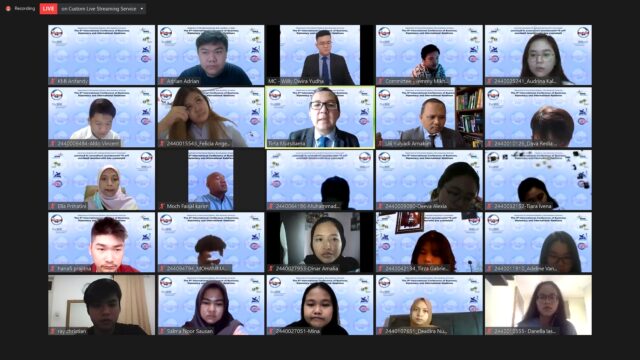
In the afternoon session consisted of 8 parallel sessions with different issues and focuses. Various issues on the response of state, market and politics to Covid -19 dominated the parallel session in the afternoon. Issues on China and international politics were discussed in 1 parallel session. While issues related to socio-economic implication, and development and inequality in the Southeast Asian region were discussed in 2 parallel sessions. All 35 papers which will be published in selected international journals indexed in Scopus. In addition, second day of the conference there was “meet the editor program” which invited editor in chief of Intellectual Discourse to share with the participants on how to publish these papers in targeted reputed international journals. As a result, the committee has secured 3 international journals who agreed to publish ICOBIRD papers in their special issues, namely Intellectual Discourse (ID), and Chinese Political Economy and Strategic Relations: an International journal (CCPS) that agreed to issue their respective special issue for ICOBIRD papers, and Journal of Institution and Economies that can accept selected papers to be published in its regular issue. Finally, I as the chair of ICOBIRD 2020 hope all papers will finally be published as planned.
Thank you.
